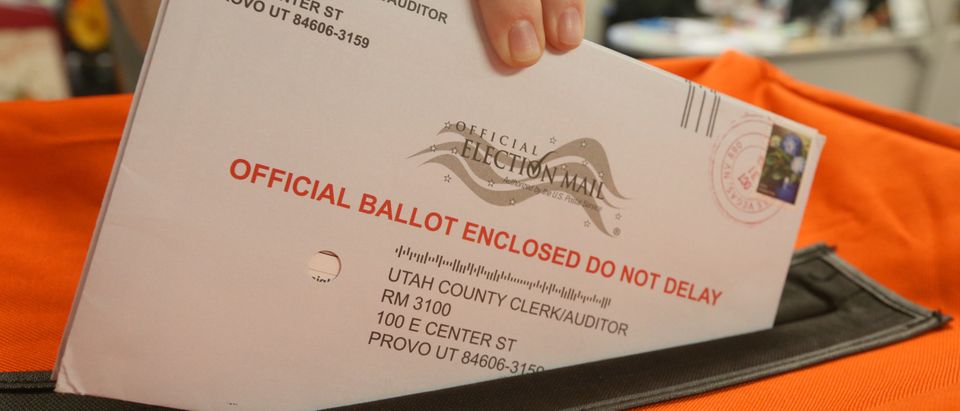The pitfalls of radically changing the election system to mass mail-in balloting in the weeks and months leading up to an election are more apparent by the day. Yet the mainstream media keeps telling us there are no problems, have never been problems and never will be. Twitter and Facebook automatically add “context” to legitimate news posts about voting troubles to explain that everything is safe and secure no matter what you just read. News organizations question whether they should call winners on election night or wait days – perhaps weeks – for stray ballots to be counted.
However, more stories emerge daily about voting-related issues that could call into question the legitimacy of the 2020 vote. Some deal with the structural problems of making rapid, complex changes to a system not designed for mass mail-in balloting. There are reports from all over the country of ballots being sent to people who are deceased, who have moved or who are otherwise are ineligible. Often this is because officials are using hopelessly outdated and poorly maintained voting lists. Judicial Watch has been closely following this persistent problem for years, and this week sued the state of Colorado, where forty of sixty-four counties have voter registration rates exceeding 100% of the eligible citizen voting-age population.
Elsewhere the hurry-up mass balloting process has led to significant blunders. Voters in Woodland Hills, CA, were sent ballots with no place to vote for president. Almost a quarter of the ballots mailed to voters in Teaneck, NJ, were printed with the wrong Congressional districts. And Franklin County, OH, election officials are still trying to find out how many of the 250,000 absentee ballots they mailed out went to the wrong people due to an “envelope stuffing” error.
Those mistakes are relatively innocent and perhaps correctable. But there has also been the kind of outright fraud that Republicans have warned about and Democrats downplay or deny. Take for example the explosive reports from Project Veritas, exposing reported illegal ballot harvesting for cash in Minneapolis with alleged ties to Rep. Ilhan Omar. Also, Carrollton, TX, mayoral candidate Zul Mirza Mohamed was arrested this week on 109 counts of fraud, which included forging eighty-four applications for mail-in ballots. And Lehigh County, PA, elections judge Everett “Erika” Bickford was busted for ballot tampering during the June 2 state primary. Saying that fraud never happens is simply untrue.
Courts have been busy dealing with the implications of the rapid changes and ad hoc decisions by state governors and elected officials. Democrats have tried to use the COVID-9 pandemic as an excuse to make arbitrary rules regarding the November vote, in particular by trying to extend the absentee ballot deadline far beyond Election Day. But as more courts weigh in, these and other efforts are not faring well.
On Monday, the U.S. Supreme Court reinstated South Carolina’s requirement that absentee ballots have a witness’s signature, overruling a lower court decision that coronavirus made this too difficult. Justice Kavanaugh noted that “for many years, this Court has repeatedly emphasized that federal courts ordinarily should not alter state election rules in the period close to an election.”
Other courts have followed this principle. The Seventh U.S. Circuit Court of Appeals affirmed a lower court ruling that keeps in place Indiana’s restrictions on who can vote by mail, and on Thursday the same court overruled a lower court decision and reinstated the November 3 due date for mail-in ballots in Wisconsin. The District Court had relaxed various Wisconsin voting restrictions and extended voting to November 9. In Arizona, the Ninth Circuit Court intervened to strike down Arizona laws regulating ballot harvesting and precinct voting, claiming they were racially discriminatory. But the Supreme Court agreed to hear the case and put a stay on enforcing the appeals court decision, leaving the Arizona laws in effect through the election.
The Texas Supreme Court ruled that election officials in Harris County, which includes Houston, cannot send out unsolicited absentee ballot applications to 2.4 million registered voters because state law limits who can vote absentee. Other recent decisions in Maine, Georgia, Iowa and New Hampshire have affirmed Election Day deadlines and upheld ballot harvesting restrictions.
On the downside, Federal Judge Michael Shipp upheld New Jersey’s new mail-in voting rules which allows ballots without postmarks to be counted up to two days after Election Day. This blatant invitation to commit fraud will probably not survive the appeals process. Also suspect is a Pennsylvania rule that absentee ballots cannot be rejected simply because the ballot signature doesn’t match the signature on file. If that is the case, why bother trying to validate the ballot at all? Look for this to be struck down too.
It should not be so hard to preserve the legitimacy of elections by maintaining basic standards that have been universally recognized as best practices. Firm election deadlines, ballot control and tracing, voter ID requirements and other such regulations exist for good reasons, pandemic or not. Already almost 7 million ballots have been cast in the 2020 election. The 2016 election was decided by around 100,000 votes in three states, and if the 2020 race comes down to similar margins the need to prevent voter fraud will be acute. It says a lot that the party that claims to be on the road to easy victory in November is also backing every measure to relax voting standards and increase the potential for a dirty election. Maybe the leftists are not as confident as they appear.
Chris Farrell is director of investigations and research at Judicial Watch, a national leader for cleaner elections. He is a former military intelligence officer.


